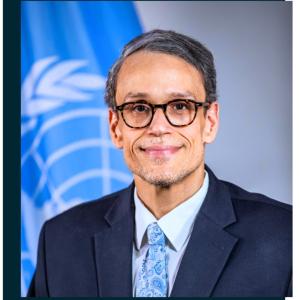A Growing Pandemic We Cannot Ignore Anymore, Why We Must End Hate Speech now
20 June 2022
By Seraphine Wakana, UN The Gambia Resident Coordinator, on the occasion of the first International Day to Counter Hate Speech
Freedom of opinion and expression are key pillars of human rights and are essential in thriving democratic societies. These core freedoms support other fundamental rights, such as the freedom of religion, the right to peaceful assembly and the right to participate in political and public affairs. The evolution of social media has contributed to strengthening and promoting the right to seek, receive and impart information and ideas. However, this evolution has also been accompanied by a more sinister trend — an increase in hate speech both online and offline.
Like in many other parts of the world, hate speech is a serious human rights concern in The Gambia. Hate speech fuels prejudice, poisons debate, and creates a toxic atmosphere that may lead to polarization and division within societies. This is especially true during election campaigns, when passions run high and inflammatory language and hate speech become more prevalent. It is quite evident, however, that people who resort to hate speech to gain political advantage betray the weakness of their own political ideas and, in so doing, weaken the fabric of a democratic society.
We must cease all forms of discrimination and hate with more progressive policies and initiatives from diverse stakeholders in society. Hate speech threatens to undermine the numerous efforts that have been made to curb inequalities, promote peaceful coexistence and human rights, and advance the political participation of women across all sectors of governance.
During the last presidential elections, the candidates were uniquely receptive of the UN’s support and commitment to mitigating hate speech within the political forum and promoting peace building. The UN supported the Inter-Party Committee to organise a high-level “National Stakeholders’ Forum on Peaceful & Credible Elections in The Gambia” in advance of the election and to persuade political leaders to endorse a “Peace Pledge” that committed them to highest standards of electioneering, including abstaining from hate speech. To their enduring credit, and to the satisfaction of international electoral observers, political leaders stood by their pledge. And when rank-and-file party members engaged in hate speech, party leaders were quick to reprimand them. The UN also supported the National Human Rights Commission and the Gambia Press Union to train journalists on how to address hate speech in their reporting, while not amplifying its hateful message, and supported the Gambia Press Union to establish the country’s first fact checking platform — factcheckgambia.org — to help debunk fake news.
Hate speech is a virus that is spreading fast and fighting it is everyone’s responsibility. This first International Day to Counter Hate Speech, celebrated on 18 June 2022, represents a call to action to address this growing menace. We must take urgent action at local, regional, and national levels to curb the spread of hate speech and to replace it with constructive civil and political discourse. We must commit to promoting initiatives and practices that promote inclusion, diversity, and peaceful coexistence. We must say #NoToHate.

Mr. Karl Frédérick Paul
As a seasoned professional, Mr. Paul brings hands-on expertise in leading international organizations with a strong focus on development programming, humanitarian preparedness and response, and social cohesion strategies, all contributing to the attainment of SDGs. His extensive experience spans multiple development sectors, involving collaboration with diverse stakeholders. Possessing robust analytical and conceptual skills, he has always demonstrated a profound understanding of sustainable development dynamics, poverty reduction, and social injustice. A dedicated leader, Mr. Paul brings extensive experience in delivering development programs, conducting policy dialogue and advocacy, fostering long-term equitable partnerships, and leading strategy development on transformative entry points, key transitions, that have essential catalytic and multiplier effects across the SDGs. He advocates that such transitions require a consideration of multiple policy levers spanning economic, social and environmental dimensions.
Furthermore, Mr. Paul is an outspoken feminist and strong advocate for climate action, for green and blue economies. He is a convener of people and connector of ideas that help countries to unlock their potential with confidence at the future. Driven by a results-oriented mindset, he emphatically believes in the transformative power of collaborative action and trust to collaborative and inclusively deliver sustainable solutions contributing to the SDGs.
Mr. Paul has a Master’s in Business Administration, Master’s Degree in Strategic Management from the University of Belgrano in Buenos Aires Argentina and a Bachelor Degree in Finance from Quisqueya University in Port-au-Prince, Haiti. He was accepted for a PhD in International Development at the London School of Economics in 2021. He is fluent in French, English, Portuguese, Spanish, Creole, German and intermediate Arabic. In his free time, Mr. Karl-Frederick Paul enjoys doing crossfit and as a classical pianist, he spends time playing pieces from his preferred classical baroque repertoire.


